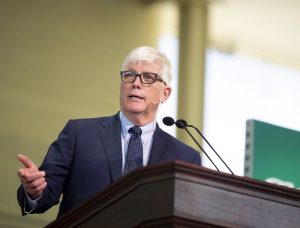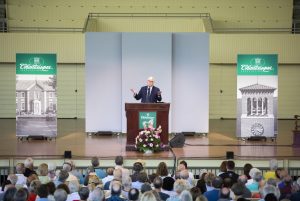
MHARI SHAW/STAFF PHOTOGRAPHER
Out of everything Donald Trump said and did in the 2016 election, Hugh Hewitt said the most consequential was raising his hand in the first debate.
According to Hewitt, that gesture has had consequences for not only the past three years, but will continue to for “the foreseeable future.”
Hewitt, host of Salem Radio Network’s “The Hugh Hewitt Show,” NBC News and MSNBC political analyst and professor of law at Chapman University, spoke at the 10:45 a.m. morning lecture Thursday in the Amphitheater, continuing Week One’s theme, “Moments That Changed the World.”
“It was a Fox News channel debate and if you go back and look it up on YouTube, you will be transfixed, because you know now what you could not have known then: that Donald Trump was actually going to become president,” Hewitt said. “No one could actually believe it. In fact, if broadcast television had a concussion protocol like the NFL, we would still all be in it.”
Hewitt said the first problem with the debate was that Brett Baier, chief political anchor for Fox, did not set a standard for audience reaction, stating it should be “somewhere between a Lebron James dunk and a Cleveland Public Library.”
“That’s not good crowd control,” he said. “It leaves a big spectrum and they used it throughout the debate, which was a new and interesting feature, but would not itself change history.”
However, what changed history in the debate was Baier’s first question. Baier asked the candidates for a show of hands from anyone who refused to pledge not to run as an independent against the Republican nominee.
“President Trump, then candidate Trump, raised his hand, looked around and as soon as he saw that no one else raised it, he put it up high,” Hewitt said. “The world turned. Why? Because suddenly the debate became about Donald Trump.”
“There are not that many center-right journalists that know how to play nice and, this is important, can take direction,” says Hewitt pic.twitter.com/zZrn1oD1jq
— The Chautauquan Daily (@chqdaily) June 27, 2019
Describing the year 2012 as a “carnival,” Hewitt said that was when presidential debates started shifting away from their original intention.
“There was a bloody and ugly series of debates that ended up with John McCain against Mitt Romney and Mike Huckabee, and it got worse in 2012 when candidates realized there is no downside to declaring for president and there was no filter to keep the manifesting, unqualified or completely improbable people off the stage,” he said.
Then-Republican National Committee Chairman Reince Priebus created three methods to reform the debate process. The first was to schedule the Republican National Convention earlier in the year.
“He moved it up because you can’t spend general election money until after the convention concludes and you are the nominee,” he said. “So, now you have the convention not in August or September, which was once the norm, but we have them in June or July.”
Second, Priebus developed a schedule of RNC-approved debates. In addition, Jeb Bush declared that if one participated in any debate but the RNC debates, they would be banned from the RNC debates, which Hewitt said “immediately had the impact of killing the debate business.”
The third rule was that the partner opportunity for broadcast networks was to be “distributed like tickets.” But, there was a catch: There had to be a “recognized opinion journalist” who favored Republican candidates on the panel, or the Republican would not win.
According to Hewitt, when Priebus implemented those guidelines, he monetized debates and therefore, they became “events.”

MHARI SHAW/STAFF PHOTOGRAPHER
“Presidential politics, at that moment, became entertainment, ratings-driven, non-serious event programming,” he said.
When that happened, Hewitt said 10 things followed:
First, because of his hand-raise, the entire campaign became about “what Donald Trump would do.”
“Since that time, because it took over, every candidate wants a moment like that in every race,” he said. “They wish to become the central character in the drama that even driven politics have become. They don’t want to be the side show, they don’t want to be a walk-on act.”
Second, what President Trump did as candidate Trump will impact every televised debate going forward. According to Hewitt, Trump did not attempt to persuade or charm. Instead, he decided to dominate.
“To dominate is very different from persuading,” he said. “It is a bludgeon-like attempt to take over the stage to both belittle and to dominate. It turned out, in a large field, if you dominate the next closest contender, you will take that contender out. Low energy Jeb, little Marco, lying Ted — you can build bridges to all of them proving that what you say in a debate doesn’t actually matter, but it developed a pattern.”
Third, questions don’t matter. Reactions to questions matter.
“Moments gleaned from the collision of personalities is what matters,” Hewitt said. “Sometimes you can generate that friction with a member of the media, but it is best to just generate that friction with one of your opponents.”
Fourth, there is no such thing as too much attention, whether it is good or bad. Hewitt said Trump built on the revelation that President Barack Obama had: “Always be out there.”
“President Obama actually would fill out his brackets for the NCAA on ESPN because he realized no attention was bad attention,” he said. “President Trump took that revelation and added that all of the attention, doesn’t matter if it’s good or bad, just suck up all of the oxygen. If there are two divers with one (canister), don’t share it.”
Fifth, “prep shmep,” meaning a candidate doesn’t really need to know anything.
“In the radio business, I like to say ‘I am frequently wrong but never in doubt,’ ” Hewitt said. “That’s actually a joke, but candidates have learned it’s true because nobody trusts anybody with regards to whether we are speaking truth or falsehood.”
Just by lecturing at Chautauqua, Hewitt said he is engaging in a “trust exercise.” Regardless of any preconceptions about him, he feels a responsibility to try to earn the trust of his audience, an idea he said Trump is not concerned with.
“President Trump demonstrated that in electoral politics, you don’t have to do that,” he said. “Some people don’t want trust, they want bodyguards.”
Hewitt, skipping point six, said the seventh thing was that character matters. However, because character is different in the “eye of the beholder,” the character of both candidates matters equally.
According to Hewitt, the only time character doesn’t matter is in the primaries.
“As of this morning, Donald Trump has a 90 percent approval rating within the Republican Party,” says Hewitt
— The Chautauquan Daily (@chqdaily) June 27, 2019
“In the primaries, the only rule is don’t lose,” he said. “Keep moving forward. Get to the next round. Stay on your feet. You don’t need any money, all you need is the attention of the media as that transmits viability as a message.”
Eighth — what a candidate said yesterday does not matter today and will matter less tomorrow.
“There are absolutely no bonus points for credibility,” he said. “There are no bonus points for consistency, there are no bonus points for not saying the exact opposite of what you said yesterday, and President Trump proved that.”
Ninth, facts don’t matter.
“Nobody cares what you say about fact-checking,” Hewitt said. “Fact-checking was politicized a dozen years ago with Dan Rather’s National Guard story. From that moment, trust in media broke. It was already low, but it broke. It was a fabricated story peddled by the most-watched man in America. So, the media can say ‘President Trump is lying, Elizabeth Warren is lying …’ Doesn’t matter if you’re on their team. Truth is relative.”
Tenth: “If you have the right enemies, you are my friend.”
“President Trump proved that,” Hewitt said. “If you have the right enemies, if Secretary (Hillary) Clinton hates you and if the elite media hates you, I don’t like them so I am going to put aside all of my other concerns and vote for you regardless. The enemy of the enemy is my friend.”
Ultimately, there is one consequence that all 10 subtheories share, and Hewitt said it is devastating to the country as a whole, not just the politicians involved.
“The consequence of the monetization of events of a debate is (that) we are becoming less serious in a moment where we have to be more serious,” he said.
In the Q-and-A, Hewitt returned to his missed sixth point: None of what happens after the presidential debate has anything to do with being a good president.
“Character still matters, but character is different in the eye of the beholder”
— The Chautauquan Daily (@chqdaily) June 27, 2019
“Secretary Clinton, I think like George Herbert Walker Bush, must still be thinking ‘How could that have happened? I had the highest SATs, the best essays, I had the most experienced job, I am emotionally and mentally equipped, I have a staff on the line, I have prepared for the job my whole life. How can I lose to Bill Clinton or how can I lose to Donald Trump?’ ” Hewitt said.
Hewitt said those two candidates were defeated because the system does not value what Abraham Lincoln demonstrated “most conclusively” in 1860: a depth of knowledge about the central issues of his time.
“(Lincoln) really did what you (Chautauquans) do, this week and every week that you’re here: He thought deeply on complicated issues and understood there really is a lot of gray in the world,” Hewitt said. “He was generous and large hearted. Our current system of electing presidents via television does not promote reflection and consider thinking.”




